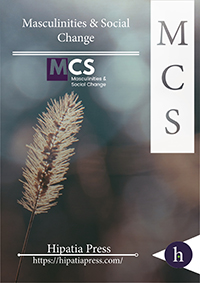“To be a Man is not Easy”: Everyday Economic Marginality and Configurations of Masculinity among Rural Ghanaian Youth
Keywords:
Downloads
Abstract
How might an African based knowledge critically cast doubt upon globally hegemonic notions and traditions in understanding and theorizing men and masculinities? This essay examines this question through a critical reading of what it may mean to be ‘an emerging adult man’. The essay privileged a critical understanding of how poverty, poor crop yields, and climate volatility shape constructions of ‘emergent adulthood’. Drawing on interviews with men from northwestern Ghana, findings suggest that emerging adult men are committed to their cultural obligations as heteronormative breadwinners, yet ‘emergent adulthood’ is complicated by status insecurity, vulnerabilities, and powerlessness. To negotiate emergent adulthood, informants combine migrating to Techiman and joining ‘boys boys’ to achieve social respect and recognition. To understand the meanings of emergent adulthood, I argue for analytical sophistication on multiple issues and daily struggles that encapsulate rural life.
Downloads
References
Abdul-Korah, B. G. (2006). ‘Where is not home?’: Dagaaba Migrants in the Brong Ahafo Region, 1980 to the Present”. African Affairs, 106, 71-94.
Google Scholar Crossref–––––––. (2008). ‘‘Ka Biε Ba Yor’: Labor Migration among the Dagaaba of the Upper West Region of Ghana, 1936–1957’. Nordic Journal of African Studies, 17, 1–19.
Google Scholar CrossrefAddis, M. E., Mansfield, A. K., & Syzdek, M. R. (2010). Is “masculinity” a problem?: Framing the effects of gendered social learning in men. Psychology of Men & Masculinity, 11, 77–90.
Google Scholar CrossrefAdinkrah, M. (2012). Better dead than dishonored: Masculinity and male suicidal behavior in contemporary Ghana. Social science & medicine, 74, 474-481.
Google Scholar CrossrefAdomako Ampofo, A., and Boateng, J. (2011). “Multiple Meanings of Manhood among Boys in Ghana.” In Sylvia Tamale (Eds.), African Sexualities: A Reader (pp. 420– 436). Cape Town: Pambazuka Press.
Google Scholar CrossrefAkyeampong, E. (1996). Drink, Power, and Cultural Change: A Social History of Alcohol in Ghana, c.1800 to Recent Times. Portsmouth, NH: Heinemann.
Google Scholar CrossrefAttride-Stirling, J. (2001). Thematic networks: an analytic tool for qualitative research. Qualitative research, 1, 385-405.
Google Scholar CrossrefCassiman, A. (2010). ‘Home call: absence, presence, and migration in rural Northern Ghana’. African Identities, 8, 21–40.
Google Scholar CrossrefConnell, R. W. (1995). Masculinities. Cambridge, UK: Polity.
Google Scholar CrossrefFiaveh, D. Y., Izugbara, C. O., Okyerefo, M. P., Reysoo, F., & Fayorsey, C. K. (2015). Constructions of masculinity and femininity and sexual risk negotiation practices among women in urban Ghana. Culture, Health & Sexuality, 17, 650–62.
Google Scholar CrossrefGroes-Green, C. (2009). “Hegemonic and subordinated masculinities: Class, violence and sexual performance among young Mozambican men”. Nordic Journal of African Studies, 18(4): 286–304
Google Scholar CrossrefHannaford, D., and Foley, E. E. (2015). a Good Man is Hard to find: negotiating Love and Marriage in Senegal. African Studies Review, 58, 205–25.
Google Scholar CrossrefHearn, J. (2019). So what has been, is, and might be going on in studying men and masculinities: Some continuities and discontinuities. Men and Masculinities. DOI: 10.1177/1097184X18805550
Google Scholar CrossrefHonwana, A. (2013). Youth and Revolution in Tunisia. London: Zed Books.
Google Scholar CrossrefIzugbara, C. O. (2015). “‘Life is Not Designed to be Easy for Men’: Masculinity and Poverty Among Urban Marginalized Kenyan Men.” Gender Issues, 32, 121-137.
Google Scholar CrossrefLentz, C. (2006). Ethnicity and the making of history in Northern Ghana. Edinburgh, Scotland: Edinburgh University Press.
Google Scholar CrossrefLindsay, L. A. (2003). Working with Gender: Wage Labor and Social Change in Southeastern Nigeria. Portsmouth, NH: Heinemann.
Google Scholar CrossrefLindsay, L. A., and Miescher, S. F. (Eds.). (2003). Men and Masculinities in Modern Africa. Portsmouth, NH: Heinemann.
Google Scholar CrossrefLindsay, Lisa A. (2007). “Working with Gender: The Emergence of the ‘Male Breadwinner’ in Colonial Southwestern Nigeria.” In Catherine M. Cole, Takyiwaa Manuh, and Stephan F. Miescher (Eds.), Africa After Gender? (pp. 241–252). Bloomington: Indiana University Press.
Google Scholar CrossrefMasquelier, A. (2013). Teatime: Boredom and the temporalities of young men in Niger. Africa, 83, 470-491.
Google Scholar CrossrefMfecane, S. (2018). Towards African-centred theories of masculinity. Social Dynamics, 44, 291-305.
Google Scholar CrossrefMiescher, S. F. (2005). Making men in Ghana. Indiana University Press.
Google Scholar CrossrefMueller, L. (2018). "Personal Politics without Clientelism? Interpreting Citizen-Politician Contact in Africa." African Studies Review, 61, 28-54.
Google Scholar CrossrefRatele, K. (2014). Currents against gender transformation of South African men: Relocating marginality to the centre of research and theory of masculinities. NORMA: International Journal for Masculinity Studies, 9, 30–44.
Google Scholar CrossrefRatele, K. (2017). African (situated) psychologies of boys, men and masculinities. Psychology in Society, 54, 10-28.
Google Scholar CrossrefSilberschmidt, M. (2001). Disempowerment of men in rural and urban East Africa: Implications for male identity and sexual behavior. World Development, 29, 657– 671.
Google Scholar CrossrefUchendu, E. (2007). "Masculinity and Nigerian youths." Nordic Journal of African Studies, 16, 279-297.
Google Scholar CrossrefDownloads
Published
Almetric
Dimensions
How to Cite
Issue
Section
License
All articles are published under Creative Commons copyright (CC BY). Authors hold the copyright and retain publishing rights without restrictions, but authors allow anyone to download, reuse, reprint, modify, distribute, and/or copy articles as the original source is cited.















